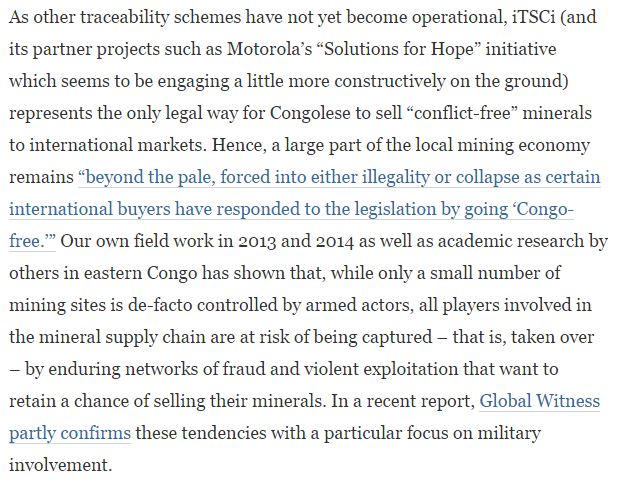So what happened? Yesterday I began to see a slew of tweets indicating some major disclosures about Dodd-Frank's conflict mineral section were coming soon. It started with this tweet:
Wednesday set to be a humdinger of a news day on DRC conflict minerals. Brace yourselves.
— Laura Seay (@texasinafrica) September 9, 2014
So I started digging and found these tweets:
#DRC: #US government acknowledges it 'cannot determine' cleanliness of supply chains despite Dodd Frank Act - http://t.co/ztqAA5c8Fv 1/4
— christoph vogel (@ethuin) September 9, 2014
#DRC: At the same time, industry claims they spent millions on determining 'conflict-free' minerals while local reality remains dire. 2/4
— christoph vogel (@ethuin) September 9, 2014
#DRC: And the US chamber of commerce seems continuing to lobby for their own profit and tries to avoid taking responsibility for #Congo. 3/4
— christoph vogel (@ethuin) September 9, 2014
#DRC: All that shows that 'conflict minerals' (b)advocacy always focused more on consumer-oriented greenwashing than helping Congolese. 4/4
— christoph vogel (@ethuin) September 9, 2014
#DRC: Same chamber of commerce that lobbied away concrete measures to help Congolese on the ground now laments Dodd Frank not helping. 5/4
— christoph vogel (@ethuin) September 9, 2014
This was predicted. Years ago, experts, including Laura Seay (@texasinafrica), were warning us that Dodd-Frank 1502 was not sufficient to ensure conflict minerals do not enter our supply chains and was actually causing harmful consequences to the people it was intended to help, by basically eliminating the artisanal mining economy in the region.
And the U.S. Commerce Department admitted as much. It "cannot determine which refiners and smelters around the world are financially fueling violence" in DRC or its neighbors.
A group of 70 global academic experts and DRC leaders released this Open Letter arguing conflict minerals efforts are not working because the legislation fundamentally misunderstands the relationship between minerals and conflict in the region.
A fundamental problem with Dodd-Frank 1502 is that it assumed all mines in the region were involved with conflict, thus miners were required to prove their innocence in a system that lacked resources and clear guidelines. Until mines could prove they were conflict-free, they had to either shut down operations, smuggle mineral to conflict-free countries, or sell minerals on the black market.
Efforts to trace DRC's conflict minerals actually created more problems and solved none of the problems it was meant to solve. Dodd-Frank 1502 created a "de facto embargo targeting the lion's share of Congolese mining communities," meaning the vast majority of artisanal miners it was meant to protect, who were never violent actors in the first place, have been abandoned by U.S. companies. At the same time, violence and armed groups in the region have not decreased significantly. Given these conditions, it's not hard to imagine some miners may feel they have no alternative but to join armed groups. This is a frightening prospect, given that "as many as 10 million people in [the Congo] rely on the industry for their livelihoods."
From the above referenced Washington Post guest post, an explanation of how this potential consequence of Dodd-Frank 1502 may come to fruition:
The designated "conflict-free" areas are also subject to corruption, due, it seems, to a lack of appropriate monitoring and the lure of easy cash. As such, conflict-free minerals from the region cannot be truly guaranteed as such, even if U.S. retailers make the claim.
So, what can be done?
The letter I referenced above includes some recommendations (on p. 3), which I've summarized:
- Increase and improve communications with Congolese government and communities in order to better understand dissenting voices, power structures, and local context.
- Design the audit process to more adequately fit within the situation on the ground, adjusting for volatile security situation and remote locations.
- Create incentives through projects on the ground, including efforts to convert former conflict actors so they don't infiltrate or subvert the process.
- Promote fair competition that will lead to fair market prices and/or minimum wages.
- Develop a wider approach to addressing conflict in the region beyond the minor role of conflict minerals.
and back in January 2012, Laura Seay included recommendations (p. 4) in her Center for Global Development Working Paper (also referenced above), which I've summarized:
- Implement Section 1502 of Dodd-Frank in more realistic stages with benchmarks
- Provide aid to affected mining communities, including education and health care
- Turn mineral traceability in to a local jobs program
- Involve Congolese leadership in implementation, including dissenters, so that compromises can be reached
- Treat security and conflict in the region as a separate issue, independent of the mineral traceability
I hope, given this week's news, that our legislators take these recommendations to heart this time.
If this topic interests you, I highly recommend you read the links I included above, as they provide context and details about this important and commonly misunderstood issue.

No comments:
Post a Comment